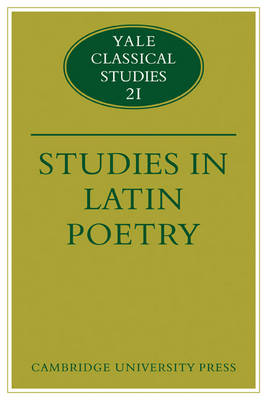Yale Classical Studies
2 total works
This volumes begins with a long essay on the nature and structure of Saturnian verse. This is followed by two studies of Plautus (the Menaechmi seen as a comedy of errors and the prologue of the Poenulus as an editor's conflation of several scripts). There is an essay on nine graffito epigrams from Pompeii, and an analysis of the poetic quality of the scientific passages in the De Rerum Natura. Catullus 64 is studied as an epitome of the whole age of heroes; and there are two essays on Horace (his handling of the rhetorical recusatio in the odes to Bacchus and his lyric prayers for poetic inspiration). The volume ends with an investigation into how much Ovid actually knew of the law, and how he exploited this knowledge with piquancy and inventiveness in his writings.
This book covers a wide range of subjects from Latin literature and language to textual history and criticism. E. D. Francis gives a history of the words prae and pro, as adverb, preposition and prefix. H. D. Jocelyn surveys the distribution and differing uses of quotations from Greek poetry in Cicero's prose writings and D. F. S. Thomson takes a fresh look at the manuscript tradition of Catullus. The remaining six articles deal with later authors and are divided equally between the poets and the historians: a reading of Horace's Roman Odes and their relation to the other odes in which he addressed the Roman people; a demonstration of the internal coherence of a Tibullan elegy and two Juvenal satires; a review of disputed readings in the OCT of Livy IX; an analysis of the structure of the prologues to the Annals, Histories and Agricola to cast light on Tacitus' intentions; and a critical review of Tacitus' portrait of Germanicus, generally viewed in a sympathetic light but debated by D. O. Ross.

